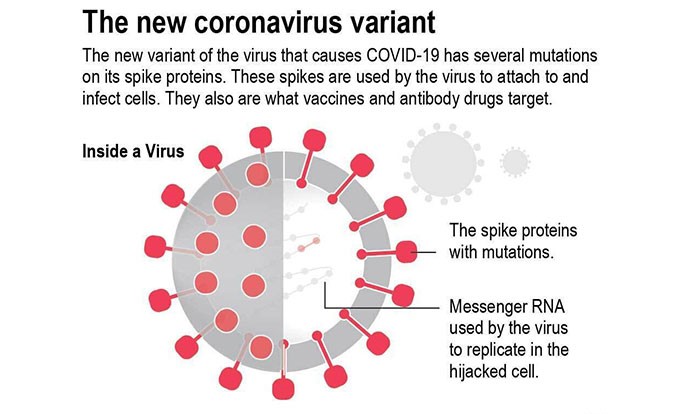Which vaccines works against new coronavirus variant?
South Africa has put its rollout of the Oxford-AstraZeneca
vaccine on hold after a study showed "disappointing" results against
its new Covid variant.
Scientists say the variant accounts for 90% of new Covid
cases in South Africa.
The trial, involving some 2,000 people, found that the vaccine offered "minimal protection" against mild and moderate cases.

Doctors Liked to Read More
There are many thousands of different versions, or variants, of Covid circulating.
Experts' concerns focus on a few:
- A UK variant now dominant in much of Britain, which has spread to more than 50 countries. In the United Kingdom, the SARS-CoV-2 B.1.1.7 variant has seventeen mutations in the viral genome with eight mutations located in the spike (S) protein.
- A South Africa variant found in at least 20 other countries, including the UK. The B.1.351 variant, first detected in South Africa, has ten mutations located in the spike (S) protein.
- A variant from Brazil
It's not unexpected that new variants have developed - all viruses mutate as they make copies of themselves to spread and thrive.
It involves a key mutation - called E484K - that may help the virus evade parts of the immune system called antibodies. The Brazil variant emerged in July and has this E484K mutation too.
There is some indirect evidence this mutation makes
coronavirus more transmissible in humans. Two studies have suggested patients
with this mutated virus have larger amounts of the virus in their swab samples.
That might suggest they were more infectious to others.
But even when it comes to transmissibility, viral load is
only an indication of how well the virus is spreading within a single person.
It doesn't necessarily explain how good it is at infecting others. The
"gold standard" of research - a controlled trial - hasn't yet been
carried out.
The mutation that has emerged could have become very widespread
just because it happened early in the outbreak and spread - something known as
the "founder effect".
Dr Thushan de Silva, at the University of Sheffield,
explains, there is enough data to say this version of the virus has a
"selective advantage" - an evolutionary edge - over the earlier
version.
Though there is still not enough evidence to say "it's
more transmissible"
There is no evidence that any of the new variants cause much more serious illness for the vast majority of people who become infected.
In general, being more transmissible doesn't mean a virus is more lethal - in fact the opposite is often true. There's no evidence this coronavirus has mutated to make patients more or less sick.
The risk is highest for people who are elderly or have significant underlying health conditions.
For the UK variant there is some research suggesting it may be associated with a 30% higher risk of death. The evidence is not strong and the data is still uncertain though.
New variants of coronavirus are emerging that are more infectious than the one that started the pandemic.
Experts think the UK strain, which emerged in September, may be up to 70% more transmissible or infectious. The latest research by Public Health England puts it between 30% and 50%.
The South Africa variant carries a mutation that appears to make it more contagious or easy to spread.
The UK, South Africa and Brazil variants could be much more contagious or easy to catch. All variants have spread at a rapid rate and are associated with increased transmission and a higher viral burden after infection
However, there is no evidence that it causes more serious illness for the vast majority of people who become infected. The risk is highest for people who are elderly or have significant underlying health conditions.
Current vaccines were designed around earlier versions of coronavirus, but scientists believe they should still work against the new ones, although perhaps not quite as well.
· Early results suggest the Pfizer vaccine protects against the new variants, but is slightly less effective.
· Data from the Oxford-AstraZeneca vaccine team suggests their vaccine protects just as well against the new UK variant. But it offers less protection against the South Africa variant - although it should still protect against severe Covid-19 illness.
· Early results from Moderna suggest its vaccine is effective against the South Africa variant, although the immune response may not be as strong or long-lasting.
· Data on two new coronavirus vaccines that could be approved soon - one from Novavax and another from Janssen - appear to offer some protection to new variants too.
Experts say vaccines could be redesigned and tweaked to be a better match for new variants in a matter of weeks or months if necessary.
Developers were likely to have a modified version of the injection against the South Africa variant, also known as 501.V2 or B.1.351, later this year. As with flu, where a new shot is given each year to account for any changes in circulating flu viruses, something similar could happen for coronavirus.
Oxford-AstraZeneca's vaccine offers "minimal protection" against mild disease from the South Africa variant, scientists say early trials suggest.
A small trial led by Oxford university and South Africa’s Wits university found that the AstraZeneca vaccine had low efficacy against milder illness with the 501Y.V2 variant.
However, based on the immune responses detected in blood samples from people who were given the vaccine, the scientists said they believed that the vaccine could yet protect against more severe cases.
Pfizer and Moderna have both said that preliminary laboratory studies indicate that their vaccines, while still protective, are less effective against B.1.351.
Novavax and Johnson & Johnson have also sequenced test samples from their clinical trial participants in South Africa, where the variant caused the vast majority of cases — and both reported lower efficacy there than in the United States.
https://www.biorxiv.org/content/10.1101/2021.01.27.427998v1.full.pdf
https://www.biorxiv.org/content/10.1101/2021.01.18.426984v1
https://papers.ssrn.com/sol3/papers.cfm?abstract_id=3779160
https://assets.publishing.service.gov.uk/government/uploads/system/uploads/attachment_data/file/950823/Variant_of_Concern_VOC_202012_01_Technical_Briefing_3_-_England.pdf
https://investors.modernatx.com/news-releases/news-release-details/moderna-covid-19-vaccine-retains-neutralizing-activity-against
https://www.nytimes.com/2021/02/07/world/south-africa-astrazeneca-vaccine.html
https://www.ft.com/content/82534b15-6f2d-41b9-9947-de674b11079c
https://www.bbc.com/news/science-environment-55404988
https://www.bbc.com/news/world-africa-55975052
https://www.bbc.com/news/health-55388846
https://www.bbc.com/news/health-55587320
https://www.bbc.com/news/uk-55967767




Comments
You must login to write comment